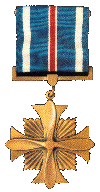 This medal
is awarded to any officer or enlisted man of the armed forces of the United States who
shall have distinguished himself by "heroism or extraordinary achievement while
participating in an aerial flight, subsequent to November 11, 1918." The decoration
may also be given for an act performed prior to November 11, 1918, when the individual has
been recommended for, but has not received the Medal of Honor,
Distinguished Service Cross, Navy Cross, or Distinguished Service Medal. This medal
is awarded to any officer or enlisted man of the armed forces of the United States who
shall have distinguished himself by "heroism or extraordinary achievement while
participating in an aerial flight, subsequent to November 11, 1918." The decoration
may also be given for an act performed prior to November 11, 1918, when the individual has
been recommended for, but has not received the Medal of Honor,
Distinguished Service Cross, Navy Cross, or Distinguished Service Medal.
The Distinguished Flying Cross, authorized by an Act of Congress of July 2, 1926 (section 3749, title 10, United States Code (10 USC 3749) amended by
Executive Order 7786 on January 8, 1938), was awarded first to Captain Charles A.
Lindbergh, of the U.S. Army Corps Reserve, for his solo flight of 3600 miles across the
Atlantic in 1927, a feat which electrified the world and made "Lindy" one of
America's most popular heroes. The first D.F.C. to be awarded to a Navy man was to
Commander Richard E. Byrd, of the U.S. Navy Air Corps, on May 9, 1926, for his exciting
flight to and from the North Pole. Both these famous aviators also received the Medal of
Honor with the Distinguished Flying Cross. The Aviatrix Amelia Earhart also received the
Distinguished Flying Cross. Her's was the only such award, as an executive order on March
1, 1927, ruled that the D.F.C. should not be conferred on civilians.
During wartime, members of the armed forces of friendly foreign nations serving with the
United States are eligible for the D.F.C. It is also given to those who display heroism
while working as instructors or students at flying schools.
The Distinguished Flying Cross was designed by Elizabeth Will and Arthur E. DuBois. It is
a bronze cross pattee, with rays between the arms of the cross. On the obverse is a
propeller of four blades, with one blade in each arm of the cross and in the re-entrant
angles of the cross are rays which form a square. The cross is suspended by a
recatgular-shaped bar and centered on this is a plain shield. The reverse is blank and
suitable for engraving the recipients name and rank.
The ribbon has a narrow red center stripe, flanked on either side by a thin white stripe,
a wide stripe of dark blue, a narrow white stripe and narrow dark blue at the edge of the
ribbon.
Subsequent awards of the Distinguished Flying Cross are indicated by oak-leaf clusters for
Army and Air Force personnel and by additional award stars for members of the Naval
services.
When this decoration was originally created there was a movement to have this awarded in
different classes, and though this idea was never approved, some copies of the higher
class were made, they are the same design as the approved Distinguished Flying Cross,
slightly larger, and with a pin attached to the reverse, so that it would be worn as a
breast decoration. This class was never approved and was never officially awarded.
An example of the gallantry for which the Distinguished Flying Cross is awarded took place
on the morning of August 31, 1969 in Vietnam. Captain Francis J. Cuddy, USMC a Helicopter
pilot, was assigned the mission of assisting in the extraction of an Army Special Forces
reconnaissance team heavily engaged in combat with a large North Vietnamese Army deep in a
mountainous area under the enemy's complete control. Captain Cuddy, undaunted by the heavy
volume of hostile fire directed at his aircraft, directed other helicopters into the area,
moved his aircraft into treetop level and delivered repeated rocket and strafing runs on
the enemy positions. As a result of his devastating attacks, the hostile fire was
suppressed sufficiently to enable the transport helicopters to safely extract the
reconnaissance team. The citation for his award went on the say ". . .Captain Cuddy's
courage, superior airmanship, and unwavering devotion to duty in the face of personal
danger were instrumental in accomplishing this hazardous mission and were in keeping with
the highest traditions of the Marine Corps and of the United States Naval Service."
Captain Cuddy was also awarded the Silver Star, three Distinguished Flying Crosses,
Commendation Medal with Combat "V," the Purple Heart and forty eight Air Medals
during his tour of duty in Vietnam.
'Aces' home page | U. S. Fighter | Feedback
|